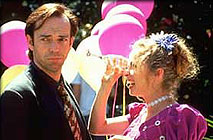|
|
|
|
Russian
Doll
|
 |
|
2001 was a depressing time for Australian movies: The Monkey's Mask, Serenades, Risk and Stavros Kazantzidis' Russian Doll. Even more dispiriting than a poor effort by a novice (as is the case with Serenades) is the spectacle of filmmakers' failing to live up the promise they earlier showed. Kazantzidis (formerly Efthymiou) impressed many with his Film School short, Road to Alice (1992), but his subsequent works as director have been disappointing. And, as with Alan White (Risk), Kazantzidis' second feature is weaker than his first, True Love and Chaos (1997). Russian Doll is a romantic comedy that fatally lacks both romance and comedy. The main characters are an uncharismatic, charmless bunch: nerdy Harvey (Hugo Weaving), cheating Ethan (David Wenham) and his prissy wife, Miriam (Rebecca Frith). The plot kicks in once Ethan convinces Harvey to 'marry for convenience' his Russian lover, Katia (Natalia Novikova). All the ensuing complications are rather predictably and indifferently handled. As the overly jaunty and nostalgic musical score indicates, Kazantzidis and co-writer Allanah Zitserman are working in the Woody Allen-ish area of the modern-relationships comedy. Unfortunately, they veer closer to television sitcom than the 'screwball' movie classics of yesteryear. The dialogue is uninspired and often trite ("Love is... crap!"), and there is little visual or physical humour to alleviate the monotonous talk. The one, intriguing, Billy Wilder-style possibility in this story – a fraught triangle between a jealous Ethan and the couple he inadvertently creates – is not taken up. To fill this void, the film relies on ethnic colour – numerous details of Jewish and Russian customs. This is not a bad idea in itself, but the recourse to basic stereotypes renders it uninteresting. Russianness, for instance, here amounts to War and Peace, copious amounts of vodka and jolly folk dancing. Much comedy begins from such clichés, but imaginative humourists (like Blake Edwards) ultimately transcend them. Russian Doll does not. The film's style is equally disheartening. Tiresome insertions – such as having the characters dart about shooting freeze-frame stills or digital home-video footage – pad out the running time. The look of the piece, combining zoom shots, an orange tint and TV-style framing, is often ugly and unflattering to the performers. The actors do their best with this mediocre material, and give the film its few funny, graceful moments. Wenham has a gift for understated comedy. Sacha Horler as Liza, Katia's fruity best friend, turns the racial stereotype to her advantage through spirited exaggeration. Weaving, however, is miscast, and all that one can say for poor Novikova is that not since Erin Brockovich (2000) – or the last Russ Meyer retrospective – has a performance been so relentlessly chest-centred. However, anyone who wants to study how completely a movie can fall apart in its final ten minutes, thus squandering any audience goodwill it may have hitherto generated, should take a look at this film. Kazantzidis obviously knows a prime convention of the romantic comedy genre: build to a wedding which is either a triumph or a disaster. The choice which Russian Doll makes in this regard is likely to satisfy very few viewers. © Adrian Martin June 2001 |
![]()